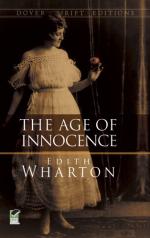The signal meant that the brougham bearing the bride and her father was in sight; but there was sure to be a considerable interval of adjustment and consultation in the lobby, where the bridesmaids were already hovering like a cluster of Easter blossoms. During this unavoidable lapse of time the bridegroom, in proof of his eagerness, was expected to expose himself alone to the gaze of the assembled company; and Archer had gone through this formality as resignedly as through all the others which made of a nineteenth century New York wedding a rite that seemed to belong to the dawn of history. Everything was equally easy—or equally painful, as one chose to put it—in the path he was committed to tread, and he had obeyed the flurried injunctions of his best man as piously as other bridegrooms had obeyed his own, in the days when he had guided them through the same labyrinth.
So far he was reasonably sure of having fulfilled all his obligations. The bridesmaids’ eight bouquets of white lilac and lilies-of-the-valley had been sent in due time, as well as the gold and sapphire sleeve-links of the eight ushers and the best man’s cat’s-eye scarf-pin; Archer had sat up half the night trying to vary the wording of his thanks for the last batch of presents from men friends and ex-lady-loves; the fees for the Bishop and the Rector were safely in the pocket of his best man; his own luggage was already at Mrs. Manson Mingott’s, where the wedding-breakfast was to take place, and so were the travelling clothes into which he was to change; and a private compartment had been engaged in the train that was to carry the young couple to their unknown destination—concealment of the spot in which the bridal night was to be spent being one of the most sacred taboos of the prehistoric ritual.
“Got the ring all right?” whispered young van der Luyden Newland, who was inexperienced in the duties of a best man, and awed by the weight of his responsibility.
Archer made the gesture which he had seen so many bridegrooms make: with his ungloved right hand he felt in the pocket of his dark grey waistcoat, and assured himself that the little gold circlet (engraved inside: Newland to May, April —–, 187-) was in its place; then, resuming his former attitude, his tall hat and pearl-grey gloves with black stitchings grasped in his left hand, he stood looking at the door of the church.
Overhead, Handel’s March swelled pompously through the imitation stone vaulting, carrying on its waves the faded drift of the many weddings at which, with cheerful indifference, he had stood on the same chancel step watching other brides float up the nave toward other bridegrooms.
“How like a first night at the Opera!” he thought, recognising all the same faces in the same boxes (no, pews), and wondering if, when the Last Trump sounded, Mrs. Selfridge Merry would be there with the same towering ostrich feathers in her bonnet, and Mrs. Beaufort with the same diamond earrings and the same smile—and whether suitable proscenium seats were already prepared for them in another world.




